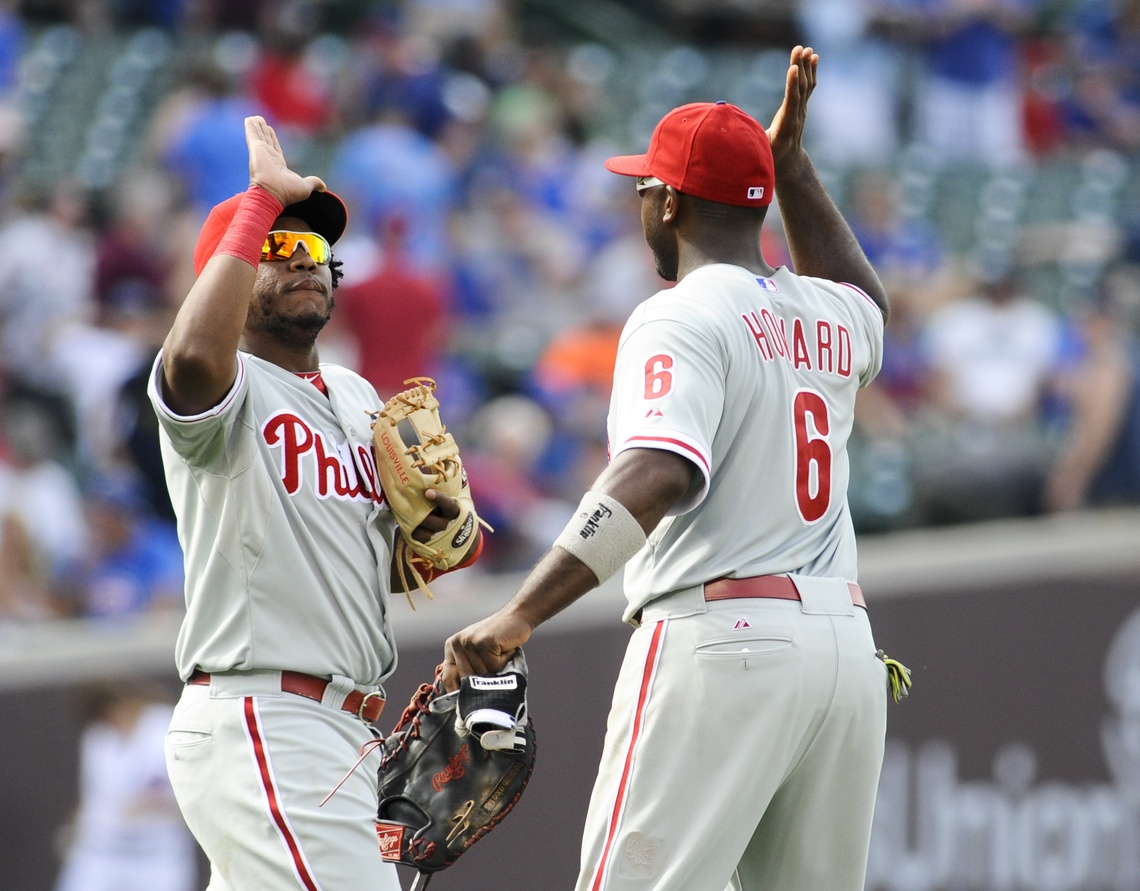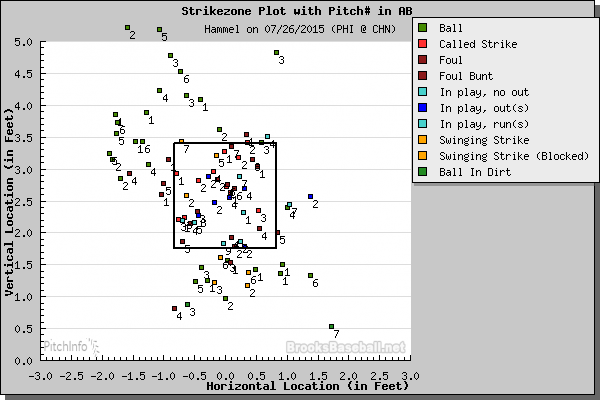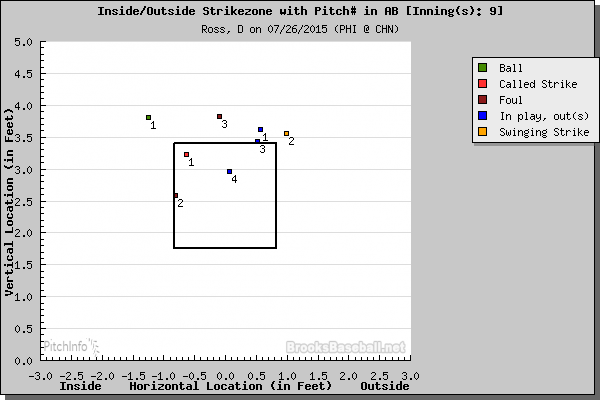Top Play (WPA): It’s beginning to get hard to not have a negative outlook when things don’t go well for the Cubs early in games. A few runs in the first inning shouldn’t be a lead that any team in professional baseball can’t come back from, but it certainly feels like it’s a death sentence for the Cubs. Jason Hammel, who struggled to maintain his control early on in his last start against the Reds, had similar issues in the first inning of this game.
Cesar Hernandez took three straight balls to lead off the game, forcing Hammel to throw eight pitches to the leadoff batter before Hernandez hit an infield single. He later stole second base and came around to score on a triple by Odubel Herrera (.132). This was followed by a home run by Maikel Franco, making the score 3-0 before the Cubs even came to bat.
Considering that the Cubs collected exactly zero hits the day before, falling behind early didn’t give me a good feeling about their chances to win the game at that point. At that point it was technically 23.8 percent, but those numbers don’t take #Cubes into account. At any rate, Hammel was all over the place in this game and just didn’t have it.
He only made it 3 2/3 innings, threw 85 pitches, and allowed six earned runs on eight hits. He went just five innings on 97 pitches in his last game, which was his first since only going one inning against the Cardinals on July 8th due to a hamstring injury. Hammel is a veteran with a track record, and ultimately I’m not concerned. But due to the recent injury, it’s worth keeping your eye on at this point.
Bottom Play (WPA): The Cubs offense got it going in the bottom half of the first, looking like it might actually be a break out game for them. Dexter Fowler took a walk to lead it off against rookie pitcher Aaron Nola, who was making his second start in the big leagues. Kyle Schwarber got the first hit of the day for the Cubs, a line drive to right field that chased Fowler all the way around to third.
With runners on the corners, nobody out, and Kris Bryant up at the plate, the reasons for optimism were rising. Bryant drove one to deep right field that was probably about a foot short of a three-run homer, but it was good for a sacrifice fly to make it 3-1. Anthony Rizzo followed by forcing a 3-0 count from Nola, who looked like he might be a bit rattled by the hard contact from Schwarber and Bryant.
Rizzo unleashed a rocket on the next pitch, but unfortunately for him and the Cubs it went right to Hernandez, the Phillies second baseman, who threw over to first to double off Schwarber (-.050). Fowler would hit a solo homer to bring the score to within 3-2 in the bottom of the third inning, but the Phillies piled more runs on as the game progressed and the final score was 11-5.
Key Moment: I’m making the key moment of this game the best part for Cubs fans, and that was the ninth inning. With the Cubs very obviously not coming back to win this game, Joe Maddon did some defensive shifting. Kyle Schwarber moved out to left field, Taylor Teagarden took over at catcher, and David Ross went out to the mound to pitch. Ross only needed eight pitches, seven for strikes, to get the Phillies to go down one-two-three.
Ross led off the bottom half of the ninth to Cubs fans chanting his name and crushed his first home run of the season (and first ever as a pitcher) into the left-field bleachers. Even in an ugly loss that brought a lot of underlying concerns to the surface, the Cubs still were able to lighten it up a bit.

Trends to Watch: Briefly when the score went to 11-2, the Cubs had been officially outscored by their opponents this season (368-366). They rallied to pull back in front by a run, but that kind of run differential is indicative of a .500 team. They’ve played a ton of one-run ballgames this year and are 21-17 in those games, a pretty great record for a team that’s 30-28 otherwise.
Records in one-run games are kind of fluky, as is better articulated by Blake Murphy at Beyond the Boxscore. The 2012 Baltimore Orioles are the benchmark for this stat, having gone 29-9 in one-run games and just 64-60 otherwise. The Cubs are nowhere near this kind of dominance, but it’s an interesting study anyway.
The Orioles finished 93-69 and scored 712 runs that year while allowing 705, a Pythagorean record of 82-80. In the following year, they scored 745 runs while allowing 709. Their Pythagorean record was 85-77, and it’s the same record they finished the season with.
The Cubs stand at 51-46, but according to their Pythagorean record they should be just 49-48. This doesn’t mean the Cubs can’t make the playoffs this year, but they have obvious deficiencies and have performed basically like a .500 team for the majority of the season.
Coming Next: The Cubs (51-46) finish their homestand with the Colorado Rockies (41-54) for three games. The first game is Monday night at 7:05 pm, with Kyle Hendricks going for the Cubs and Jorge De La Rosa going for the Rockies. Hendricks got BABIP’d to death early in his last start against the Reds, giving up five runs on seven hits in six innings while striking out nine batters. In his previous four starts, he had allowed just one earned run in 26 innings pitched with 21 strikeouts to just three walks.
De La Rosa has a 4.62 ERA/4.47 FIP/4.08 DRA this year in 16 starts, but has a 4-0 record and a 2.32 ERA against the Cubs in 10 career games (six starts).
Lead photo courtesy of Matt Marton-USA TODAY Sports


